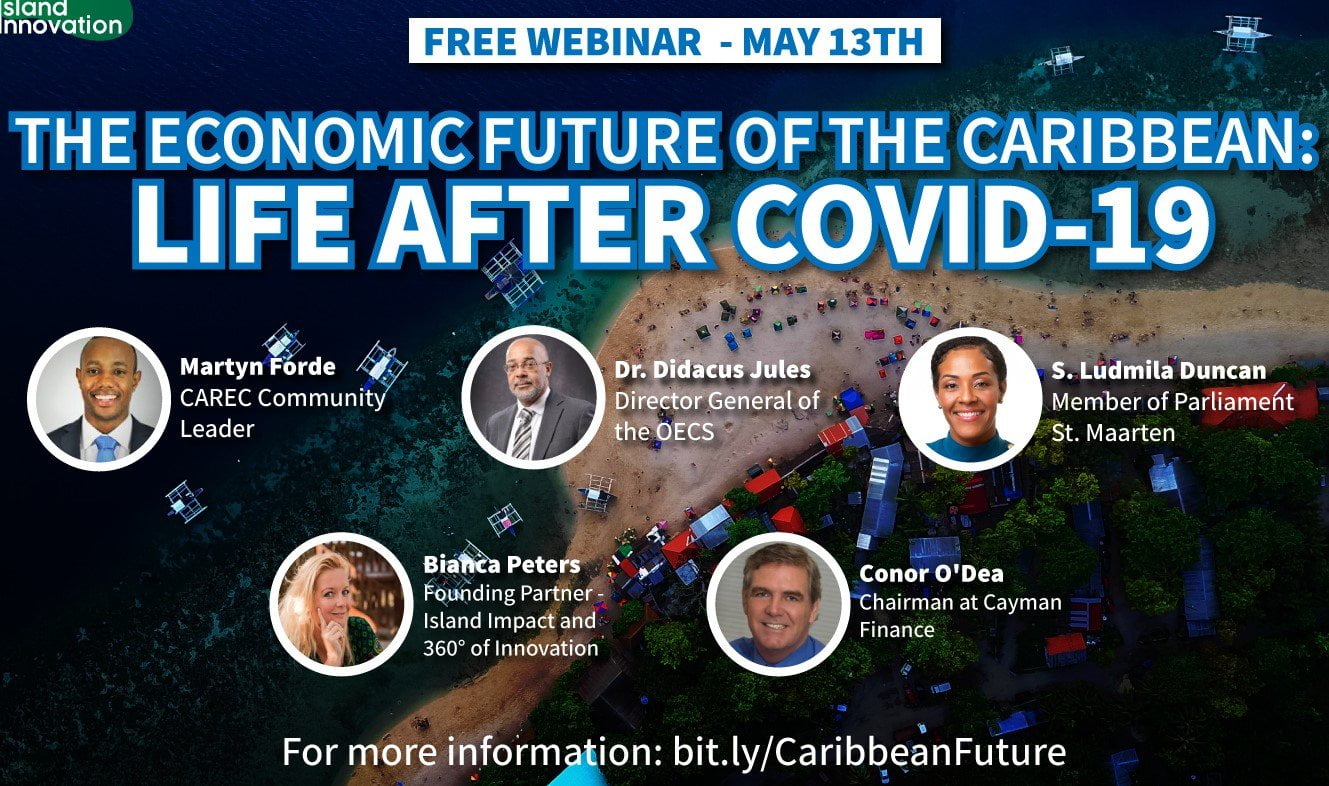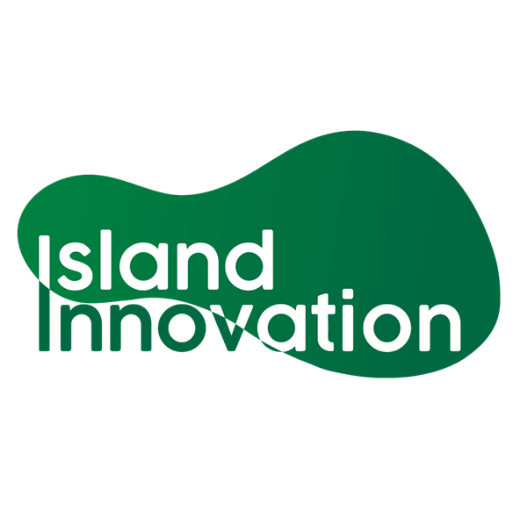As with the first in our Island Responses webinar series, ‘Islands and the COVID-19 Pandemic’, the second in the series, ‘The Economic Future of the Caribbean: Life After COVID-19’ webinar, was a great success, with in-depth presentations from our diverse group of speakers, an excellent discussion conducted by our moderator and a range of thought provoking questions and comments from our attendees. We also invite you to continue the conversation over in our Facebook and LinkedIn groups.
Some quick statistics on the webinar:
- 5 expert speakers from Barbados, St Lucia, St Maarten, Aruba & The Cayman Islands.
- 1,343 registrations.
- 725 joining live through Zoom
- 1,870 views on Facebook (and counting!)
We would also encourage you to read our new policy brief co-authored with the University of Strathclyde’s Centre for Environmental Law & Governance and contribute to our survey request for data on island responses to COVID-19. See you at the next session!
Content summary:
This webinar showed there is a significant level of interest for this topic, as the COVID-19 pandemic continues to affect communities in the Caribbean region. In his brief introduction to this webinar, Island Innovation Director James Ellsmoor gave a quick summary of the Island Responses webinar series which as well as this webinar focussed on the Caribbean, there was also a webinar that encompassed island responses from around the world entitled ‘Islands and the COVID-19 Pandemic’, and then an upcoming webinar on 20th May 2020 which will look at the specific situation in Jamaica which can be registered for here: The Economic future of Jamaica: Life after COVID-19.
Moderator: Martyn Forde – Energy & Knowledge Management Consultant at Rocky Mountain Institute, Toronto and CARILEC Renewable Energy Community (CAREC), St Lucia
Martyn Forde currently lives and works in Toronto, Canada, but as a native of Barbados he has a wealth of knowledge and experience related to the Caribbean region, including in one of his current positions working for CARILEC (Caribbean Electric Utility Services Corporation) as an Energy & Knowledge Management Consultant at the CARILEC Renewable Energy Community. This made Martyn an excellent choice as moderator for this webinar which he performed brilliantly, first of all introducing each of our expert speakers, then later on directing questions to them which he had chosen from the audience Q&A section of the webinar.
Dr. Didacus Jules – Director General of the Organisation of Eastern Caribbean States (OECS), St Lucia
Dr. Jules is the Director General of the OECS, an organisation headquartered in St Lucia that has been in existence for almost 40 years and is an 11 member grouping. During the webinar he gave an excellent presentation about the effects of COVID-19 on this 11 member group of the OECS. His presentation was divided into three clear main sections; the situation in the OECS pre-COVID-19, the present impact of the pandemic, and finally what life will be like in this region after the COVID-19 crisis has ended. As he explained, up until the current pandemic the economy of the OECS and Caribbean region as a whole had been largely dependent on tourism with the Travel & Tourism industry accounting for a high percentage of both employment and jobs, but the COVID-19 crisis is having a devastating impact on this industry and the economy as whole. He strongly suggested that in the long term, the crisis should be viewed as an opportunity for a much more diverse and inclusive economy and society. Dr Jules also announced OECS’s new report: COVID-19 and Beyond: Impact Assessments and Responses.
MP Ludmila Duncan – Member of Parliament, St. Maarten
MP Duncan is a newly elected Member of Parliament of Sint Maarten which she introduced in her presentation as a constituent kingdom of the Netherlands that encompasses the southern 40% of the divided island of Saint Martin, with the northern 60% of the of the island constituting the French overseas collectivity of Saint-Martin. She also described how the population is overwhelmingly urban and the majority is employed in tourism with mass layoffs and reduced hours due to COVID-19. In her insightful presentation MP Duncan described how the crisis actually offers a significant opportunity for a change in mindset and in how people will live, work and communicate. Innovation needs to be at the core and small businesses must be protected with a participatory, sustainable and technologically based approach to overcoming the difficulties of the pandemic and for a large-scale shift away from the one pillar economy of sole reliance on mass tourism.
Bianca Peters – Founding Partner at Island Impact and 360 Degrees of Innovation, Aruba
In her presentation Bianca Peters also described the need for innovation to help the islands of the Caribbean to become more resilient to crises such as the current pandemic, but also other major disasters like environmental destruction associated with global climate change. She described a project that she is currently involved in that was started recently in order to help alleviate the poverty caused by the COVID-19 crisis called Happy To Give Back. On this website 100% of money donated goes towards providing food banks and for warm meals for vulnerable groups in Aruba, with 200,000 dollars raised so far. Bianca believes it is vital to close the gap between the poorest and richest in Aruba and the rest of the Caribbean in order to avert significant social unrest in the future. She also described how it is very important for islands in the Caribbean to be able to gain funding from larger outside countries that are connected to, such as The Netherlands.
Conor O’Dea – Chairman at Cayman Finance, Cayman Islands
Conor O’Dea offered a different perspective from the other speakers, as he is involved in the financial sector, as opposed to governmental or non-profit. In his presentation he discussed how the COVID-19 is likely to escalate from a health, to a humanitarian to a solvency crisis. Even in The Cayman Islands which many people may see as doing well, because of its strong financial sector, Conor described how this is not the case as most people are employed in tourism and around 15 – 20,000 people will move away. He emphasised that this is a multi-year crisis and there are no quick fixes. He believes that the only way governments in the Caribbean and other developing countries worldwide can deal with the huge issues they are facing is to ask for debt forgiveness. He also added how it is vital for countries and islands of the Caribbean need to work together to become better integrated and must fight to overcome the feelings of hopelessness among the youth.
Following these insightful presentations by our four different guest speakers, Martyn then continued by introducing a series of questions related to the common questions being raised by the webinar attendees such as:
What role do you see for clean energy in creating opportunities in the short or long term for the Caribbean as well as creating resilience?
Dr. Didacus Jules: What is critical is that we need a well thought out plan. Green energy has a key role to play (solar, wind, wave etc.), and we need to decide how this is going to be integrated into the future economy of the Caribbean. It is vital to make this transition though as the cost of electricity is one of the major factors for poverty and inequality in the region.
What are the first steps needed to addressing infrastructural development?
Ludmila Duncan MP: What COVID-19 has done is exasperated what was already an issue. One of the biggest issues has been political instability, because we see some of the decisions that should have been made quite some time ago have not been made, as we are somewhat behind in terms of renewable energy. Our Duth Carribean neighbours are much further ahead in moving towards becoming 100% renewable energy efficient. We have a lot of opportunities in St. Maarten, but we just need to move our efforts, political will and spending in that direction.
What are some of the challenges you have faced in facilitating flows of capital from the Caribbean diaspora (Caribbean nationals living overseas)?
Bianca Peters: One word that I would use is mindset. Are we willing to collaborate and work together with other islands within the Caribbean and organisations outside of the region. Once the mindset of collaboration has been created, then there is the technical knowledge that is there to help guide us. We can set up and do whatever we want, such as these Zoom meetings. I advocate the triple-helix way of working together i.e. Government, Private and Knowledge Centres working together which is much more effective. Mindset and the triple-helix approach is key.




